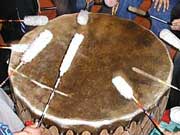Part 8: Returning to the Red Road
August 20, 2003
 |
| Tribal elder Frank Dickinson is a believer in the prophecy of the seven fires. It foretold a rebirth of the Anishinaabe people. Dickinson says young people are the hope for a better future. (MPR Photo/Tom Robertson) |
Leech Lake Reservation — As more American Indians seek out their spiritual heritage, many of them disagree over what is traditional.
Some insist all ceremonies must be in the Ojibwe language. They reject attempts to make ceremonies more accessible by conducting them in English. Red Lake historian Jodie Beaulieu says the spiritual path has to be walked slowly.
"Nowadays, people are picking up the pipe and elders are questioning where the person may have got the right to do that," Beaulieu says. "Some people are just off into it without any kind of hesitation, you know. If you do it that quick and that fast, it just seems like you're jumping on a bandwagon."
Others say ceremonies should change to meet the needs of today's American Indians. They argue the spiritual philosophy is more important than ceremony.
 | |||
When Sally Fineday Morrison serves dinner, she sets aside a plate of food for the spirits. It's a traditional Indian way of offering thanks. Fineday Morrison struggled for years to find spiritual balance. She grew up on the Leech Lake Reservation near Bemidji. In her house, religion was rarely discussed. Her father quietly practiced traditional spirituality, but the Lord's Prayer hung on a living room wall.
She says she always felt different -- always left out. When her classmates were let out of school for religious classes, she had to stay behind.
"And I used to say, 'Can't I go to church?' And Mom would say, 'Well, you know, that's not your religion.' And I'd say, 'Why don't I have religion?'" Fineday Morrison recalls. "I used to feel bad, because the only way I could participate would be to be the person that goes along and holds out the flag so kids could cross the street and go to church. It was funny. I used to feel I didn't belong, I didn't have religion in my life."
Sally Fineday Morrison says that empty spot remained unfilled as she left the reservation, went to college and got married. After her marriage failed she moved back to the reservation. She began exploring Anishinaabe spirituality.
|
The teachings and the healing that comes out of belonging to Medewiwin, and participating in other ceremonies, really can heal individual people ... and can heal communities by rebuilding those spiritual foundations that used to sustain us through so much. If Native people are to survive as distinct Native people, this is the way.
- Tony Treuer |
It was a struggle at first. She ran into a wall of secrecy. But she was persistent. Eventually, she was invited to ceremonies. She remembers one of the first ceremonies she attended at an established Midewiwin lodge.
"That was so incredible. The air in there was electric. I could have cried -- it was so beautiful," she recalls. "In fact, just talking about it I can feel the way it felt that night."
Sally Fineday Morrison says American Indian spirituality needs to be more accessible. She says Indian people are hungry to fill the spiritual void in their lives. But they don't know where to start.
"They don't feel like they're going to fit. They're not going to understand. Because if you've ever gone to any American Indian ceremony there's a lot of don'ts," says Fineday Morrison. "Don't do this, don't do that. And you get people into that and they're like, 'Gee, you know what? I don't fit here because everything I do is wrong. Or everything I say is wrong. And I feel like an idiot.'"
Despite barriers, more people are following the Red Road. More people are offering tobacco. More are turning to the Great Spirit.
Some spiritual leaders call the resurgence a silent revolution. Indian people are quietly turning to the ways of their ancestors. Tribal elder Frank Dickinson is a believer in the prophecy of the seven fires. It foretold a rebirth of the Anishinaabe people. Dickinson says young people are the hope for a better future.
"Soon enough it's going to come where we're all going to be joined together again. You ain't gonna stop that. Churches -- nobody's ever going to stop the people from coming," says Dickenson. "And maybe we won't see none of that in our time. But the time is going to come, because the prophecies that have been told to the Red people, it tells that."
The spiritual rebirth in Indian country faces many obstacles. Indian communities struggle with chronic poverty. They have enormous social problems. Few people speak their native language. The death of every old man or old woman breaks a link with the past. The dominant culture has pushed Native spirituality into a corner.
But traditional Anishinaabe believe in the healing power of the spirits. Tony Treuer says that faith offers the ultimate hope. "There are a lot of lost, hurting people in the Indian communities today searching for that belonging in gangs, in violence, in alcohol abuse, a lot of people nursing the wounds from some really awful history in all kinds of dysfunction," Treuer says.
"I know the teachings and the healing that comes out of belonging to Medewiwin, and participating in other ceremonies, really can heal individual people, physically and spiritually, and can heal communities by sort of rebuilding those spiritual foundations that used to sustain us through so much.
"Indeed, if Native people are to survive as distinct Native people, this is the way."
Credits:
Reporters: Dan Gunderson, Tom Robertson
Broadcast editor: Kate Smith
Online editor: Melanie Sommer
Historical audio recordings provided by the South Dakota Institute of American Indian Studies
|
News Headlines
|
Related Subjects
|

